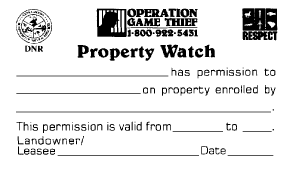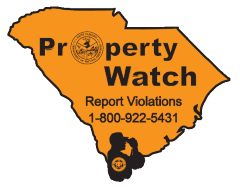Prevention
Prevention is extremely important. Trespass and unauthorized entry upon land might be difficult to prove in some cases. Although such unlawful acts are aggravating and irritating (and could even possibly result in physical injury or death from irresponsible hunting practices), there might be few provable damages to merit a civil lawsuit where no physical injury has resulted. Even when the landowner has suffered civil damages, the wrongdoer might have no assets to pay the compensation. Clearly, the best approach is to take steps to avoid the problem before it arises. There are many preventive measures a landowner can take to deter trespassing and it is strongly suggested that landowners and lessees utilize some of the following:
- Property Activity - It is important for a landowner to show activity around property. By keeping gates, signs, firebreaks, and roads maintained, the property assumes a "cared about" look. Many unethical hunters will avoid trespassing on property that shows activity.
- Properly Posting Property - Though some trespass laws do not require property to be posted, posting property further deters trespassing and abuse. Property should be posted every 100' and at access points. Suggestions for signs and DNR sponsored signs can be found here.
- Maintain Gates/Cables - By hindering parking and access; gates and cables deter trespassing and give the property a "protected" look.
- Absentee Landowners - A problem often occurs when a
landowner lives away from the property and cannot maintain
proper watch over property. There are many ways to protect
property even if the landowner is absent. Some suggestions are:
- Lease the hunting rights to an ethical hunting club. This club will then protect the property for the landowner. Should the landowner allow hunting for no charge in exchange for property security; a lease should still be completed to allow the lessee to sign warrants and prosecute property right violations.
- Communicate with neighboring property owners and ask the property owners to assist you in maintaining property integrity. Neighboring property owners are effected by your properties use and will normally be glad to assist.
- Contact the DNR and enroll the property into the Property Watch Program.
- Written Permission - Persons legally allowed to hunt the
property should be given written permission from the
landowner to assist the DNR officers in identification of legal
hunters on the property.
 A simple and effective way is with
printed business cards with the name of the hunter and the
landowners signature. An example of these cards is given to
the local DNR officer for reference. A sample Property Watch
Permission Card is shown here. Property Watch cards as shown, can be ordered by mail.
A simple and effective way is with
printed business cards with the name of the hunter and the
landowners signature. An example of these cards is given to
the local DNR officer for reference. A sample Property Watch
Permission Card is shown here. Property Watch cards as shown, can be ordered by mail.
- Advise DNR of Problems - A landowner should meet with a local DNR officer, showing property and property lines or enroll the property into the Property Watch Program. The DNR officer should be given a copy of the "permission card" along with the name and telephone number of a responsible (able to sign warrants) contact party.
- Emergency Contacts - All users of the landowner's property should have telephone numbers for the local DNR office, Operation Game Thief (this is printed on each hunting license), local police or sheriffs office, and fire control agencies.
- Attention to Detail - The landowner must be aware of unusual or unexplained happenings on property. Things such as tire tracks, vehicles pulling off on the road shoulder, fresh footprints, trees scared by climbing stands, spent shell casings, etc... will serve as warnings to the landowner of problems. Any evidence of trespass should be photographed or preserved.
- Actively Prosecute all Violators on the Property - Warnings for trespassing are an invitation to return for unethical hunters. Actively assist in the prosecution of all violators on the property.
- Gather all Information Possible on Violations - It is important to know that the DNR officer will base a decision on the information that the landowner records. The more detailed the information, the better the chances of proving your case. A Property Watch checklist is available for download.

